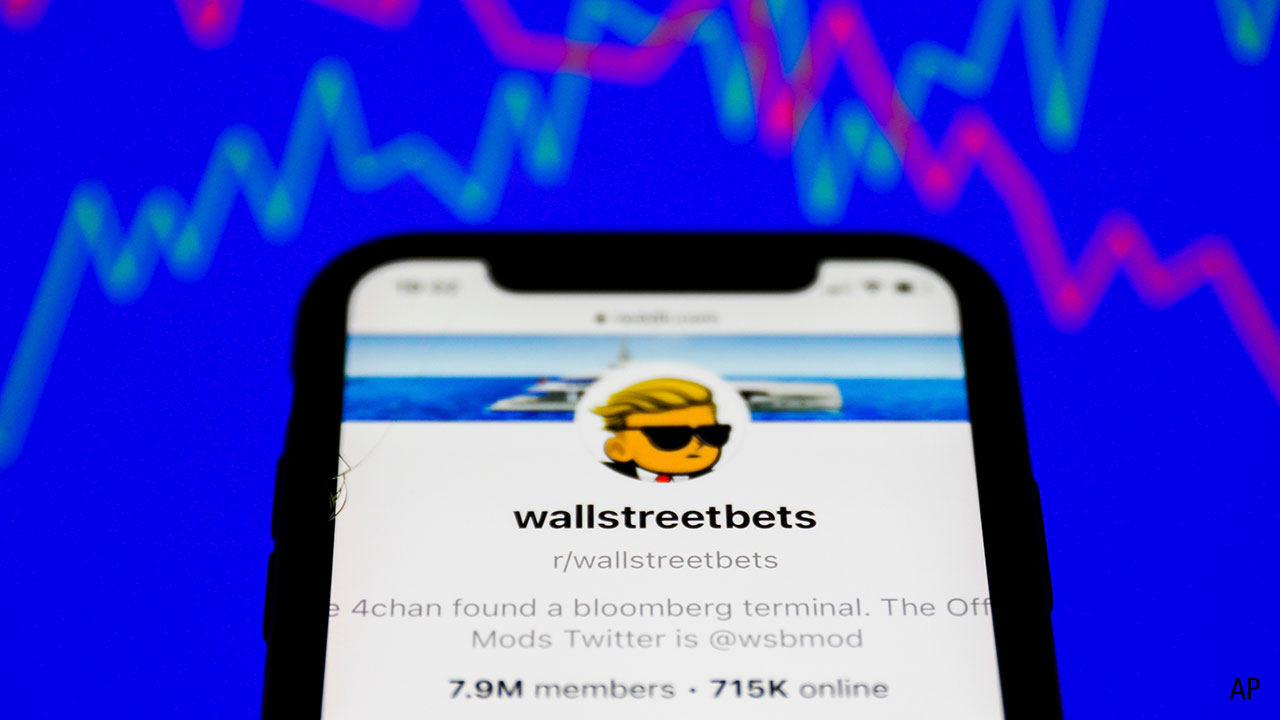
Although the magnitude of the rise startled me - the stock gained 2,500% in two weeks - the GameStop (GME) surge was not otherwise remarkable. Individual investors have been in a mood since the Covid-19 shutdown, as has been evidenced by, among other items, the rise of Tesla (TSLA), Peloton (PTON), and Bitcoin. Enthusiasm reigns.
Broadly speaking, today's market climate resembles that of the late 1990s. Then, too, upcoming individual investors were aggressive, trading Internet stocks from accounts they had established within discount-brokerage firms. They also brandished their youth as a virtue, believing they understood technology better than did their stodgy elders. (Likely true).
Their behaviour was isolated because there was no practical method for uniting them. Thus, while the underlying conditions for the two eras are similar - a rising investor class that sought to push aside its predecessors - the outcome has been different. Thanks to social media, today's Young Investment Turks are organised. They use the power of their numbers to force market prices to obey their will.
All of which is fine. No laws prevent people from sharing investment ideas (although not if they do with the goal of moving the stock's price). Quite the contrary; the Investment Company Act of 1940 was enacted so that shareholders could do just that. More to the point, investment clubs have historically served the same function, but in non-regulated fashion. The Reddit forum WallStreetBets, or WSB, which kicked off the GameStop frenzy, is in effect a virtual investment club.
It is, however, an investment club with attitude. WSB readers bought GameStop for two reasons. One was profit. Because the company's stock had been heavily shorted, a steep rise in its price, which WSB investors could generate by buying GameStop en masse, would lead to an even-greater gain after those short-sellers became squeezed. The second motive was morality. Not only could GameStop buyers punish short-sellers, but the rally would also damage hedge funds, which held most of those short positions. Win-win.
With these two motives at the heart of the conversation, the GameStop frenzy has posed the question: Who are the true heroes and villains of the stock market?
Are Short-Sellers the Villains?
The narrative positioning short-sellers as villains surprised me, because until recently they were popular heroes.
Consider the movie The Big Short. The movie centres on Dr. Michael Burry (portrayed by Christian Bale), who shorted collateralised mortgages in his hedge fund, and Mark Baum (played by Steve Carell), based on Steve Eisman, who (yes) managed a hedge fund and (yes) shorted investments.
Burry and Eisman were not heroes. They were professionals who saw the chance to make an investment buck. That was their job, and not a particularly dangerous or noble occupation at that. They neither risked nor saved lives. And their transactions only profited if homeowners failed. For them to be vindicated--that is, for audiences to cheer the success of the film's protagonists--residential homeowners needed to suffer.
Phrasing it this way makes short-sellers sound depraved indeed. But is profiting from company failures inherently immoral? The immorality claim is situational rather than principled. That is, those who decry profiting from corporate losses are happy to do so, if they believe the opposition deserves its fate.
I don't believe The Big Short's portrayal of short-sellers as champions, nor WSB's belief that they harm innocent parties, can be justified. Whether their positions are short or long, investors are investors. And if short-sellers sometimes exaggerate their target's shortcomings, so too do those with long positions. Investment hype flies in both directions.
But if short-sellers aren't heroes or villains, neither are hedge funds. It seems the belief that they are villains arises more from symbolism than from actual events. The problem is not crimes that hedge funds have committed--such as overcharging their customers while underperforming the stock market--but instead what they represent: Wall Street at its most privileged and coddled.
What About the Redditors?
Some observers have suggested that if there is a bad actor in these proceedings, it's the WSB investors themselves for disrupting the stock market. But I disagree. Ultimately, neither the motives of WSB's readers nor their methods deserve criticism. If GameStop's buyers invested for personal reasons as well as pecuniary, that is their right. The stock market does not test investor intentions. And if those trades were legal, as with the GameStop purchases, it's nobody's fault if the market wobbles. If the regulators perceived a problem, then they can devise a solution to prevent its reoccurrence.
In short, the stock market's workings are purely business. Whether participants are motivated solely by the wish to make money or have other desires is immaterial. Those who bought GameStop were not nobler than those who had sold it short. Neither, however, should their behavior be blamed.
Maybe Wall Street Is Rigged Against Investors
OK, so maybe the participants aren't to blame. Is it, perhaps, the larger system that is rigged against common investors? Political movements from opposite sides of the spectrum seem to have been united on this.
But for those of us who have spent our careers following mutual funds, this sentiment is difficult to understand. Mutual funds and their younger siblings, exchange-traded funds, are thoroughly populist investments. Their performances are comparably calculated; their portfolios publicly posted; and their costs uniformly assessed. All investors within a given share class receive the same treatment.
As a result, fund investors typically receive what they expect: a portfolio that reliably tracks an investment marketplace. And matching the overall marketplace, by definition, is not losing a rigged game. Nor is lacking the opportunity to own hedge funds.
Quite literally, an employee who doesn't even realize that he has a pension - someone who has been autoenroled into a Vanguard target-date fund - would have earned higher profits over the past decade than the typical hedge fund investor.
Those who invest in stocks directly also fare well. Today, commissions either are explicitly free or effectively so, as the remaining discount brokers levy only a nominal fee. The barrier that commissions once placed between retail and institutional investors has been removed.
And information for retail stock investors has never been more freely available, nor has trading ever been so accessible, thanks to advancements in technology and communications.
There's no question that Wall Street's business practices are often distasteful (again, consider the content of The Big Short), and the animus toward hedge funds is understandable. By design, hedge funds operate in near secrecy and do not accept ordinary investors. But there's a difference between disliking Wall Street--or at least, disapproving of the favours it receives--and criticising the integrity of the investment process. The former is certainly acceptable. The latter, though, is a step too far. What's more, such claims harm those who have not yet invested by dissuading them from doing so. The vitriol punishes the less fortunate.
Investing vs. Speculation
The Reddit community may have thrown a wrench in how the game is played, but ultimately, investing is investing.
The only truly troubling aspect of this episode is that GameStop's stock didn't just cross the line that separates investing from speculation--it leapt over that barrier, like Bob Beamon at altitude, then trampled the evidence into the sand so that the mark may never again be found.
If given a choice between buying into the GameStop stock bubble or Dutch tulips, I will take half a dozen bulbs and a bag of garden soil, thanks very much.




























